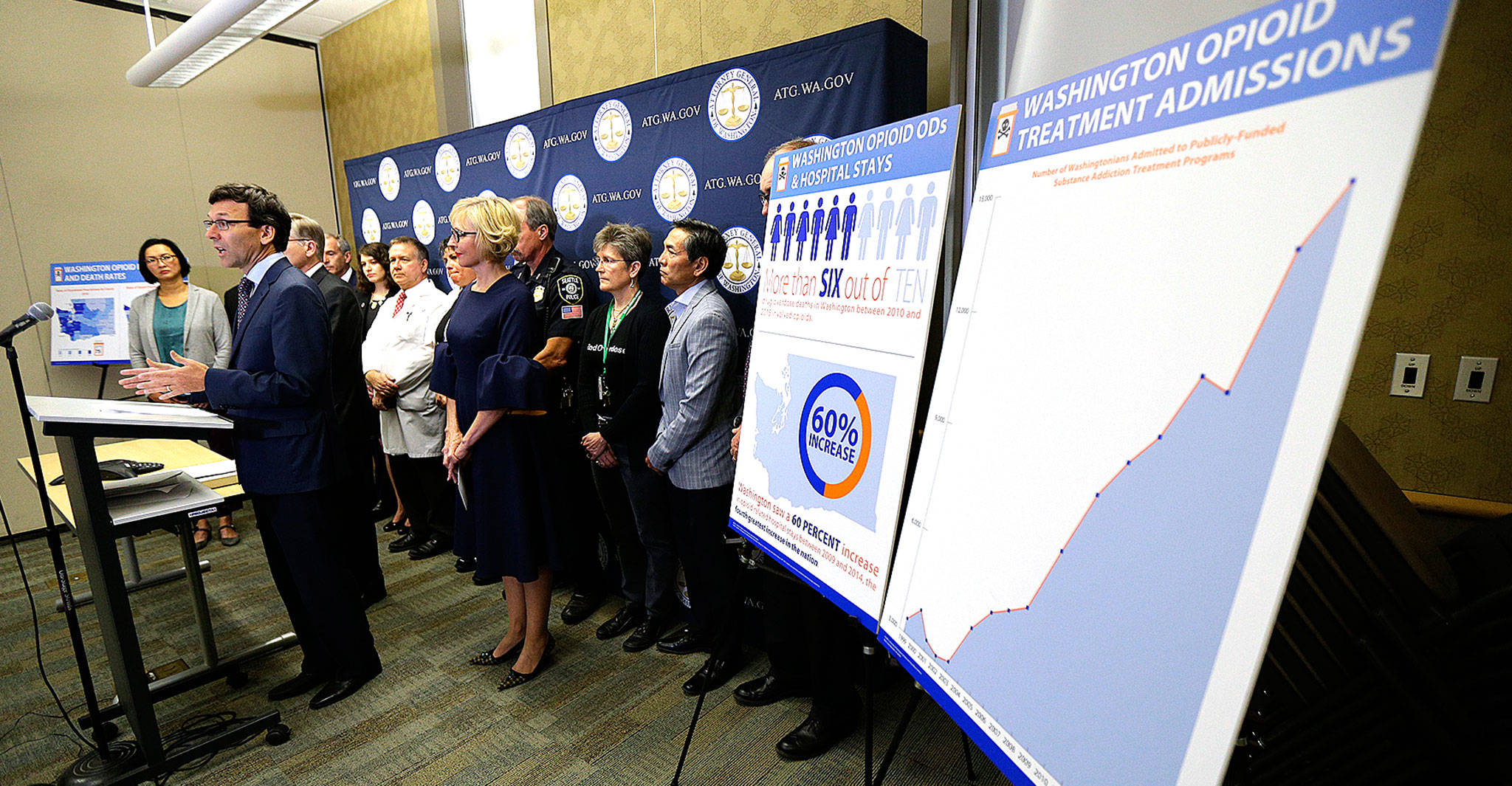Herald staff and Associated Press
SEATTLE — The state and the city of Seattle on Thursday joined Everett and more than two dozen other governments across the country in suing to hold opioid makers accountable for an addiction crisis that has claimed thousands of lives.
Like those other entities, Washington and Seattle are seeking a sizable settlement to recoup costs of coping with what’s been described as an epidemic, including millions of dollars spent on medical emergencies, criminal justice and social services.
“Unlike earthquakes and hurricanes, this disaster is a human-made crisis,” Seattle City Attorney Pete Holmes told a news conference at Harborview Medical Center, where officials said more than 100 people were being treated for addiction.
The latest suits, filed separately in King County Superior Court, accuse the companies of deliberately overstating the effectiveness of their prescription painkillers while misleading patients and doctors about the risks of addiction — in violation of Washington’s consumer protection laws.
The state’s complaint names Purdue Pharma, the maker of OxyContin. Seattle’s suit names several defendants, including Purdue, Teva Pharmaceutical, Janssen Pharmaceuticals, Endo Pharmaceuticals and Allergan.
In a written statement, Purdue denied the allegations but said it is “deeply troubled” by the addiction crisis and “dedicated to being part of the solution.”
“As a company grounded in science, we must balance patient access to FDA-approved medicines, while working collaboratively to solve this public health challenge,” it said.
Lawsuits filed against Purdue and other pharmaceutical companies have been piling up. Plaintiffs include Everett and Tacoma, Orange County in California and the states of Ohio and Mississippi.
In addition, there has been a multi-state investigation under way into the companies’ actions, which could lead to a national settlement. Connecticut Attorney General George Jepsen has said there are early indications that drug makers and distributors will discuss the matter with the states.
Washington pulled out of the effort. Attorney General Bob Ferguson said Thursday he withdrew because he was ready to sue now in light of the ongoing harms opioid addiction is causing in the state. Nearly 10,000 people have died from overdoses in the state since 2000, he said.
“Purdue Pharma has knowingly conducted an uncontrolled experiment on the people of Washington state and the American public without any reliable, clinical evidence that opioids are safe or even effective at treating long-term, chronic pain,” he said.
“I don’t know how executives of Purdue Pharma sleep at night. I honestly don’t,” he said.
The city of Everett sued Purdue in January, and on Tuesday a federal judge in Seattle ruled that the Everett case can proceed in federal court.
Purdue Pharma had asked U.S. District Judge Ricardo Martinez to dismiss the lawsuit, saying the company could not be held responsible for local effects of opioid addiction. The judge rejected most of Purdue’s arguments.
He did limit some of the city’s claims, including an allegation the company created a public nuisance. The city has 30 days to file an amended complaint.
Ferguson called Tuesday’s ruling in the Everett case “positive.”
The city and state cases are different, said Tad Robinson O’Neill, an assistant attorney general.
Everett’s lawsuit aims at the effect of Purdue’s alleged failure to prevent diversion of OxyContin to the illegal drug trade in the city, he said. Washington’s legal action deals with the company’s deceptive marketing practices and the resulting negative effects statewide, he said.
Among its claims, the state alleges Purdue failed to investigate and intervene when it was reasonable to presume from the volume of sales to a provider that the person was overprescribing OxyContin.
As an example, it recounts the case of Dr. Delbert Lee Whetstone, an osteopath who operated a pain management clinic on Evergreen Way in Everett. In 2012, he was sentenced to three years in federal prison after pleading guilty to federal crimes related to hiding money from the IRS and prescribing controlled substances without a legitimate medical purpose.
Investigators said Whetstone prescribed nearly 88,000 pills of 80 mg OxyContin — the dosage most likely to be abused — in 10 months in 2009. In comparison, officials at Providence Regional Medical Center Everett ordered 13,400 of the tablets, according to court papers.
Purdue was sued a decade ago in Washington. Several states alleged the company had engaged in deceptive marketing. Purdue agreed to pay the states $19.5 million as part of a consent judgment. Washington received more than $700,000. As part of the judgment, Purdue agreed to implement diversion detection programs. The suit filed by the state does not allege any violations of the judgment.
On Thursday, Ferguson and Holmes were joined at the news conference by Rose Dennis, of Kirkland. She said her son became addicted as a 12-year-old when he spent nine months hooked to an opioid drip while being treated for leukemia at a Seattle medical center. He’s now 31 and has struggled since his teens with addiction and homelessness.
She said she knew he had a problem when she visited him in treatment, and he asked her to leave, saying, “This is my happy time.”
She declined to sue the doctors, she said: “In reality, they saved my son’s life from cancer.”
The U.S. Centers for Disease Control and Prevention found that in 2015 drug overdoses killed more than 52,000 Americans. Most involved prescription opioids such as OxyContin or Vicodin or related illicit drugs such as heroin and fentanyl. People with addictions often switch among the drugs.
This story combines reporting from Herald writer Jerry Cornfield and Associated Press writer Gene Johnson.
Talk to us
> Give us your news tips.
> Send us a letter to the editor.
> More Herald contact information.

























